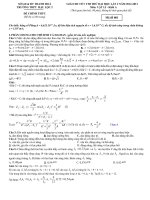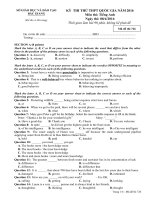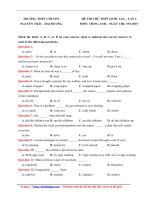De thi thu THPT lan 2 anh 12 2017 ma 132
Bạn đang xem bản rút gọn của tài liệu. Xem và tải ngay bản đầy đủ của tài liệu tại đây (66.51 KB, 4 trang )
SỞ GDĐT NINH BÌNH
TRƯỜNG THPT HOA LƯ A
(Đề thi gồm: 04 trang)
ĐỀ THI THỬ THPT QUỐC GIA LẦN 2
NĂM HỌC: 2016 - 2017
MÔN: TIẾNG ANH 12
Thời gian làm bài: 60 phút
Mã đề thi: 132
Họ, tên thí sinh:..........................................................................
Số báo danh:...............................................................................
Mark the letter A, B, C, or D on your answer sheet to indicate the underlined part that needs
correction in each of the following questions.
Question 1: Robert spent three sleepless nights to try to solve the problem.
A. to solve
B. to try
C. sleepless
D. nights
Question 2: The major goals of primary education is to achieve basic literacy and numeracy among
all students.
A. and
B. to achieve
C. of
D. is
Question 3: Since poaching is becoming more seriously, the government has imposed stricter laws to
prevent it.
A. seriously
B. poaching
C. stricter
D. it
Mark the letter A, B, C, or D on your answer sheet to indicate the sentence that best combines
each pair of sentences in the following questions.
Question 4: You shouldn’t tell her the news. It might kill her.
A. Because she shouldn’t be told the news, she might be killed by it.
B. She shouldn’t be told the news because she might be killed by it.
C. She shouldn’t be told the news so she might be killed by it.
D. So she shouldn’t be told the news, she might be killed by it.
Question 5: They’re my two sisters. They aren’t teachers like me.
A. They’re my two sisters both of those are teachers like me.
B. They’re my two sisters, neither of whom are teachers like me.
C. Like me, neither of my two sisters aren’t teachers.
D. They’re my two sisters who neither are teachers like me.
Read the following passage and mark the letter A, B, C, or D on your answer sheet to choose the
word that best fits each of the numbered blanks.
Some time ago, scientists began experiments to find out (6) _____ it would be possible to set up a
“village” under the sea. A special room was built and lowered into the water of Port Sudan in the Red
Sea. For 29 days, five men lived (7) _____ a depth of 40 feet. At a much lower level, another two
divers stayed for a week in a smaller “house”. On returning to the surface, the men (8) _____ that they
had experienced no difficulty in breathing and had made many interesting scientific observations. The
captain of the party, Commander Cousteau, spoke of the possibility of cultivating the seabed.
The divers in both “houses” spent most of their time exploring the bottom of the sea. On four
occasions, they went down to 360 feet and observed many extraordinary forms of the marine life, some
of (9) _____ had never been seen before. During their stay, Commander Cousteau and his divers
reached a depth of 1,000 feet and witnessed a gathering of an immense school of crabs which
numbered, perhaps, hundreds of millions. They also found out that it was (10) _____ to move rapidly
in the water in a special vessel known as a “diving saucer”.
Question 6: A. where
B. whether
C. what
D. how
Question 7: A. in
B. at
C. from
D. on
Question 8: A. wished
B. asked
C. said
D. spoke
Question 9: A. who
B. what
C. that
D. which
Question 10: A. capable
B. possible
C. hardly
D. able
Mark the letter A, B, C or D on the answer sheet to indicate the word whose underlined part
Trang 1/4 - Mã đề thi 132
differs from the other three in pronunciation in each of the following sentences.
Question 11: A. climate
B. examine
C. invitation
D. inteview
Question 12: A. established B. decreased
C. endangered
D. influenced
Mark the letter A, B, C, or D on your answer sheet to indicate the word(s) CLOSEST in meaning
to the underlined word(s) in each of the following questions.
Question 13: Many scientists agree that global warming poses great threats to all species on Earth.
A. thanks
B. risks
C. hopes
D. lucks
Question 14: Let's put off that meeting to next Monday.
A. postpone
B. follow
C. arrange
D. appoint
Read the following passage and mark the letter A, B, C, or D on your answer sheet to indicate the
correct answer to each of the questions.
ENVIRONMENTAL ACTIVISTS
Paul Watson is an environmental activist. He is a man who believes that he must do something, not
just talk about doing something. Paul believes in protecting endangered animals, and he protects them
in controversial ways. Some people think that Watson is a hero and admire him very much. Other
people think that he is a criminal.
On July 16th, 1979, Paul Watson and his crew were on his ship, which is called the Sea Shepherd.
Watson and the people who work on the Sea Shepherd were hunting on the Atlantic Ocean near
Portugal. However, they had a strange prey; instead of hunting for animals, their prey was a ship, the
Sierra. The Sea Shepherd found the Sierra, ran into it and sank it. As a result, the Sierra never returned
to the sea. The Sea Shepherd, on the other hand, returned to its home in Canada. Paul Watson and his
workers thought that they had been successful.
The Sierra had been a whaling ship, which had operated illegally. The captain and the crew of the
Sierra did not obey any of the international laws that restrict whaling. Instead, they killed as many
whales as they could, quickly cut off the meat, and froze it. Later, they sold the whale meat in
countries where it is eaten.
Paul Watson tried to persuade the international whaling commission to stop the Sierra. However, the
commission did very little, and Paul became impatient. He decided to stop the Sierra and other whaling
ships in any way that he could. He offered to pay $25,000 to anyone who sank any illegal whaling
ship, and he sank the Sierra. He acted because he believes that the whales must be protected. Still, he
acted without the approval of the government; therefore, his actions were controversial.
Paul Watson is not the only environmental activist. Other men and women are also fighting to protect
the Earth. Like Watson, they do not always have the approval of their governments, and like Watson, they
have become impatient. Yet, because of their concern for the environment, they will act to protect it.
Question 15: In paragraph 3 the word “it” refers to _____.
A. whale meat
B. the Sierra
C. the ship
D. the Sierra crew
Question 16: The Sea Shepherd was hunting _____.
A. the Atlantic Ocean B. Portugal
C. the Sierra
D. whales
Question 17: According to the reading, an environmental activist is someone who _____.
A. is a hero, like Paul Watson
B. talks about protecting endangered species
C. does something to protect the Earth
D. does nothing to protect the Earth
Question 18: The author implies that Paul Watson lives in _____.
A. the Sierra
B. Portugal
C. Canada
D. Atlantic Ocean
Question 19: How much did the international whaling commission do to stop the Sierra?
A. Very little
B. A lot
C. Nothing
D. Quite a lot
Question 20: The members of a ship’s crew are _____.
A. all of the people on a ship, including the passengers
B. the people who own the ship
C. the men and women who work on the ship
D. the passengers on a ship
Question 21: The word “captain” in the paragraph means a person _____.
Trang 2/4 - Mã đề thi 132
A. in control of a ship
B. in control of a football club
C. in the army
D. runs a company
Read the following passage and mark the letter A, B, C or D on your answer sheet to indicate the
correct answer to each of the following questions.
After inventing dynamite, Swedish-born Alfred Nobel became a very rich man. However, he
foresaw its universally destructive powers too late. Nobel preferred not to be remembered as the
inventor of dynamite, so in 1895, just two weeks before his death, he created a fund to be used for
awarding prizes to people who had made worthwhile contributions to humanity. Originally there were
five awards: literature, physics, chemistry, medicine, and peace. Economics was added in 1968, just
sixty-seven years after the first awards ceremony.
Nobel's original legacy of 9 million dollars was invested, and the interest on this sum is used for the
awards which vary from $30,000 to $125,000.
Every year on December 10, the anniversary of Nobel's death, the awards (gold medal, illuminated
diploma, and money) are presented to the winners. Sometimes politics plays an important role in the
judges' decisions. Americans have won numerous science awards, but relatively few literature prizes.
No awards were presented from 1940 to 1942 at the beginning of World War II. Some people have
won two prizes, but this is rare; others have shared their prizes.
Question 22: What is the main idea of this passage?
A. Alfred Nobel became very rich when he invented dynamite.
B. Alfred Nobel won the first prize in science.
C. Alfred Nobel left all of his money to his family.
D. Alfred Nobel made a lasting contribution to humanity.
Question 23: According to the passage, Nobel's profession was in _____.
A. science
B. literature
C. teaching
D. medicine
Question 24: The Nobel prize was established in order to _____.
A. spend money
B. recognize worthwhile contributions to humanity
C. solve political differences
D. honor the inventor of dynamite
Question 25: In how many fields are prizes awarded?
A. 2
B. 6
C. 10
D. 5
Question 26: What does the word "he" in the first paragraph refer to?
A. week
B. dynamite
C. death
D. Nobel
Question 27: In the first paragraph, "worthwhile" is closest in meaning to _____.
A. economic
B. small
C. valuable
D. expensive
Question 28: In which area have Americans received the most awards?
A. Science
B. Literature
C. Economics
D. Peace
Question 29: How much money did Nobel leaves for the prizes?
A. $125,000
B. $155,000
C. $30,000
D. $9,000,000
Mark the letter A, B, C, or D on your answer sheet to indicate the most suitable response to
complete each of the following exchanges.
Question 30: Mary is talking to a porter in the hotel lobby.
Porter: Shall I help you with your suitcase?
Mary: _____
A. Not a chance.
B. That’s very kind of you.
C. I can’t agree more.
D. What a pity!
Question 31: Two friends Diana and Anne are talking about Anne‘s new blouse.
Diana: That blouse suits you perfectly, Anne.
Anne: _____
A. Never mind.
B. Don’t mention it. C. Thank you.
D. You’re welcome.
Mark the letter A, B, C, or D on your answer sheet to indicate the word that differs from the
other three in the position of primary stress in each of the following questions.
Question 32: A. disappearance B. conservation
C. understand
D. vulnerable
Question 33: A. explain
B. purpose
C. control
D. involve
Trang 3/4 - Mã đề thi 132
Mark the letter A, B, C, or D on your answer sheet to indicate the sentence that is closest in
meaning to each of the following questions.
Question 34: Parking is not allowed here.
A. You musnt’t park your car here.
B. You won’t park your car here.
C. You may not park your car here.
D. You need not park your car here.
Question 35: The captain to his men: “Leave the ship immediately!”
A. The captain invited his men to leave the ship immediately.
B. The captain suggested his men leave the ship immediately.
C. The captain ordered his men to leave the ship immediately.
D. The captain begged his men to leave the ship immediately.
Question 36: The mechanics ought to repair the car at once.
A. The car ought be repaired by the mechanics at once.
B. The car ought to be repaired by the mechanics at once.
C. The car ought to be repair by the mechanics at once.
D. The car ought to repair by the mechanics at once.
Mark the letter A, B, C, or D on your answer sheet to indicate the word(s) OPPOSITE in
meaning to the underlined word(s) in each of the following questions.
Question 37: During the five-decade history the Asian Games have been advancing in all aspects.
A. rising
B. raising
C. declining
D. increasing
Question 38: The consequences of the typhoon were disastrous due to the lack of effective measures.
A. beneficial
B. damaging
C. meaningful
D. excited
Mark the letter A, B, C, or D on your answer sheet to indicate the correct answer to each of the
following questions.
Question 39: _____ is a sport in which people or teams race against each other in boats with oars.
A. Swimming
B. Fishing
C. Running
D. Rowing
Question 40: Toxic chemicals from factories are one of the serious factors that lead wildlife to the
_____ of extinction.
A. fence
B. wall
C. bridge
D. verge
Question 41: _____ the bad weather, we went swimming with our friends.
A. Because
B. Because of
C. In spite of
D. Although
Question 42: You _____ books from the library without the librarian’s agreement.
A. must be taken
B. mustn’t be taken
C. must take
D. mustn’t take
Question 43: The film is about a girl who _____ disappeared while on a picnic at Hanging Rock.
A. mysteriously
B. mystery
C. mysteries
D. mysterious
Question 44: The assignment _____ next week.
A. will complete
B. will be completed C. will have complete D. will be completing
Question 45: A game is divided into quarters ranging _____ five _____ eight minutes in length.
A. between – and
B. in – to
C. from – to
D. at - of
Question 46: You _____ continue. You've made your point clearly enough already.
A. can't
B. don't have
C. won't
D. needn't
Question 47: John failed again. He _____ harder.
A. should have tried
B. can have tried
C. may have tried
D. might have tried
Question 48: He’s decided to go and teach abroad, _____ will be an interesting experience for him.
A. that
B. when
C. where
D. which
Question 49: If you _____ a book, you have a brief look at it without reading or studying it seriously.
A. put away
B. dip into
C. pick up
D. put down
Question 50: Tomatoes _____ before they are completely ripe.
A. can be picked
B. can pick
C. needn't pick
D. should be picking
THE END
Trang 4/4 - Mã đề thi 132









